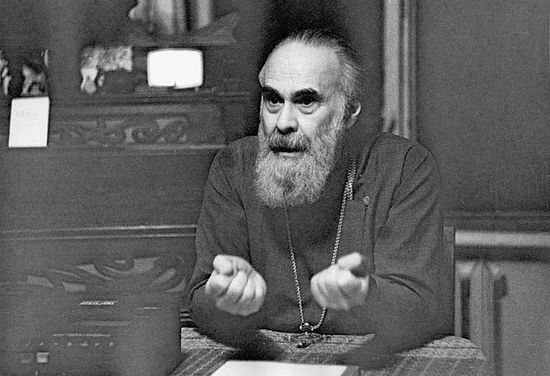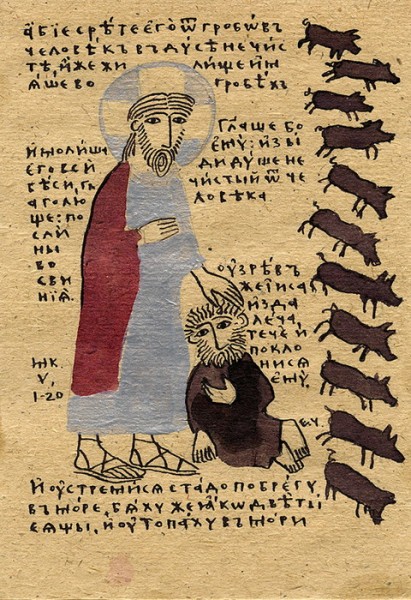 As we begin the fifth chapter of the Gospel according to Mark, I would like to read the first seventeen verses to you, and then we will take a look at their meaning.
As we begin the fifth chapter of the Gospel according to Mark, I would like to read the first seventeen verses to you, and then we will take a look at their meaning.
And they came over unto the other side of the sea, into the country of the Gadarenes. And when he was come out of the ship, immediately there met him out of the tombs a man with an unclean spirit, Who had his dwelling among the tombs; and no man could bind him, no, not with chains: Because that he had been often bound with fetters and chains, and the chains had been plucked asunder by him, and the fetters broken in pieces: neither could any man tame him. And always, night and day, he was in the mountains, and in the tombs, crying, and cutting himself with stones. But when he saw Jesus afar off, he ran and worshipped him, And cried with a loud voice, and said, What have I to do with thee, Jesus, thou Son of the most high God? I adjure thee by God, that thou torment me not. For he said unto him, Come out of the man, thou unclean spirit. And he asked him, What is thy name? And he answered, saying, My name is Legion: for we are many. And he besought him much that he would not send them away out of the country. Now there was there nigh unto the mountains a great herd of swine feeding. And all the devils besought him, saying, Send us into the swine, that we may enter into them. And forthwith Jesus gave them leave. And the unclean spirits went out, and entered into the swine: and the herd ran violently down a steep place into the sea, (they were about two thousand;) and were choked in the sea. And they that fed the swine fled, and told it in the city, and in the country. And they went out to see what it was that was done. And they come to Jesus, and see him that was possessed with the devil, and had the legion, sitting, and clothed, and in his right mind: and they were afraid. And they that saw it told them how it befell to him that was possessed with the devil, and also concerning the swine. And they began to pray him to depart out of their coasts.
This story is many-faceted; one can approach it from many sides. I’d like to spend a little time talking about these different sides and before all else to direct your attention to one circumstance connected with the Lord Jesus Christ. The Saviour Jesus Christ is God Who became man. He is the Word of God Who created the universe; He rules the whole world by His wisdom. And suddenly here, as in a whole series of other occurrences, He forgets about everything, it seems, because in front of Him is a specific need, one specific suffering person: this is enough for Him to turn all His divine and human attention to that person. This is a remarkable trait in Christ; this is a remarkable trait in God. We often think that there are great and worthwhile things, and things that are small and hardly worth our attention. But it is not so with God. There is no suffering, no pain, no need, no joy that God cannot relate to completely, with all His Being, and sometimes introduce a new element into a hopeless situation — open, as it were, a door, which makes a way out of this situation where there was no way out before.

And here Christ, God of the universe, as if forgetting everything in the world, focuses all His attention on this man, because this man is suffering, because he needs help, because he is in grief. It is worth thinking about this, because we do not behave thus with people in need. When poverty encompasses hundreds or thousands of people, we suddenly wake up and begin to act, but when there is one lone person before us suffering, while round about us are the cares of life, our own needs—everything that makes up our private and public life—we pass by. Well yes, he is suffering, but that is a small, private matter—can we possibly compare it with world history or with world events? And we forget that each person is infinitely precious, that no one quite like him exists or will ever exist, that he is unique in all the universe and unto all ages. And we need to pay attention to him at any moment, exclusively, even when circumstances and life call us to something else, to what seems to us to be broader and deeper.
At one time I was a doctor, a surgeon in the war, and it was terribly difficult for me when I saw how the war was swallowing everything up, how frightfully the war was advancing—and yet my sole care had to be the man who lay before me on the operating table. There was nothing else in the whole world—even if they opened fire on the hospital or medical post where we happened to be, it was not my concern. Only one man existed: that man—there was no other.
A certain priest comes to mind… He came to me and said that his wife had asked him to speak with me. Their life had become dismal ever since his activity as a priest had expanded: he was occupied only with other people, while he hardly saw his wife and children. As a result, his wife was miserable and his children didn’t have a father. I said to him then, “You know what to do—cut your pastoral activity in half.”
“How can I do that? It’s my duty before God and men!”
“No—your first congregation is your wife and children.”
“But I’ll answer for everyone that I leave without attention during this time. I could go to hell for this!”
Then I said to him, “You know, if you do this in obedience, then I’m the one who will go to hell, not you.”
He brightened up and said, “Oh, then everything is all right!” (I didn’t entirely sense that, but I was glad that he answered that way.) “And what should I do?”
“Half the time that you had devoted to your flock, give to your wife and children. Take complete care of them, and you’ll see what will happen.”
A few months went by, and his wife came to me and said, “You know, I simply can’t understand what has happened in our family: my husband dropped half of his pastoral work and now he gives all this time to us. But his pastoral work has been totally transformed. Instead of his running from house to house, a countless number of parishioners come to our house and say, ‘We came to your house because we want to see what God can accomplish in a family if that family is wholly devoted to Him. Your family life is a shining example in our parish. We don’t need Fr. V. to visit us constantly; it’s enough to come and see what God is working in your midst, and, convinced of it, to go home in peace and live likewise.”
Isn’t this remarkable? Is it not an example, is it not a parable in action and in real life?
Now that I’ve spoken about Christ Himself, I’d like to stop and take a look at the demoniac. A demoniac is a person who is possessed, who does not have control over himself, who is as it were a laughingstock and plaything of other powers. These other powers—I am deeply convinced of this, as the Holy Scriptures and the life and teaching of the Holy Fathers of the Church teach us—can be actually demonic, but do not always act on such a scale and with such vividness as they are portrayed here. It can be chertovschina, in our Russian sense of the word.1A man can be possessed by a passion for drink, can be a drunkard, can have fits of hard drinking, or a man can be a lecher. It can be a person incapable of refraining from anger; it can be a person who is uncontrollably drawn to theft; it can be a person who burns with hatred, envy, jealousy or whatever it may be. Take a good look at your own soul, as in a mirror, and you will see how many passions there are in it—maybe small, maybe not so tragic as outright demon possession—how many such passions there are in each of us, which do not let us have the freedom to be fully worthy of ourselves. Remember the words of Nekrasov: “Although great and fierce is the rage in me, when it comes to the deed, my hand freezes.”2Replace the word “malice” with the word “inspiration,” “desire” and you will see how many times you have “Oh, yes, how I would like to…! Oh, yes, I would do it with such eagerness…!” But when it comes down to the deed, you stop in your tracks. Therefore we ought to have a sober attitude not only towards the dramatic demon-possessions that we find in Holy Scripture and in our lives among the people around us (although more rarely than it sometimes seems), but also think about the lesser demons, which also make us lesser and strangers to God’s truth and man’s truth, just like this demoniac.
But what is remarkable about this man is that he doesn’t just behave as one possessed. As soon as the demoniac finds himself in Christ’s presence, even when he still sees Him from afar, he sees in Christ peace, he sees in Him harmony, he sees in Him the wholeness of true Man, and at the same time in this wholeness he clearly sees God hidden in Him. And he falls at Christ’s feet and worships Him, because even for the demons God is the One Who reigns over all, Who is the Master of the universe, of the visible and invisible world.
But these demons remain demons. The possessed man falls at Christ’s feet, but the uncleanness, the unclean forces, the unclean inclinations in him cry out to Christ: “Why hast Thou come? Leave us, go away!”
And the Savior asks, “What is your name?”
“Our name is Legion,” that is, a whole horde lies in this man, as in a nest. And what lies in us? How many little devils, how many lesser demons possess us: envy, and jealousy, and lasciviousness, and cowardice, and falsehood, and greed, and avarice, and hatred, and malice, and refusing to forgive when someone offends us, and so on and so on. One may say that a legion lies in us, as well.
And Christ commands them to depart—but for these demons, to depart means to return to the abyss. They want to remain in the visible world somehow, so as not to go to the outer darkness prepared for the devil and his servants, and they beseech Christ, “Let us go into this herd of swine.” We often hear the question: why, what was it about these swine that attracted them? It was the fact that, among the Jews as well as the Moslems, pigs are a symbol of uncleanness, and of all the animals that were round about, the demons saw the one creature that proclaimed to all just who they were. They departed—where? Into the domain of ritual uncleanness.
What happens when this uncleanness gains power is graphically illustrated further on: the whole herd runs and throws itself into the sea, and perishes. From this it is quite evident what happens if evil—even little imps, even a lesser abomination, is given full freedom: it will lead us to perdition, to ruin, and to death.
***
And what next? Next something terrible happens. The swineherds run to rouse all the people in the villages and in the city, telling them what happened, and the people hurry to see what indeed was performed there, to have a look at the demoniac—and they see that he is now in his right mind and clothed. But where are the pigs? Drowned. And here a frightful thing happens: It isn’t important to them that this man is healed—but that the pigs are dead—yes, that’s really horrible. They don’t want to see this happen again. They turn to Christ and say, “Get out of our territory. The salvation of one man at such a price, at such an impact on our wallets—no, we do not agree to this.” We read such a story with horror and we think: how is this possible? But in actual fact, are we really willing in every individual case to sacrifice our prosperity and property so that one person becomes well, enters into life, regains consciousness? Not always. And therefore let’s not reproach these Gadarene people too much, but think about ourselves. How would I answer? If suddenly all my property — everything I had put my hopes on in order to grow rich and live well—were taken away from me only so that one person could become normal, healthy, could begin a new life—what would I say to this? Let’s reflect on this, because we are not better than these people in everything.
And next? Christ leaves, and the former demoniac wants to follow Him: “I will come with Thee.” He does not want to part with the Man Who gave him a new life. And Christ says to him, “No, go home to thine own and tell them what happened.” “Thine own” are these very residents, Gadarenes—they, too, may have lost some swine. How would they receive him…? Besides this, we all know that witnessing to strangers is not so difficult, because they don’t know us, but to witness about something great that has happened to us personally to our close ones is far more difficult. The answer is often: “Well, tell us! This happened to you? Such a miracle happened? Such things don’t happen to people like you!” And that’s what Christ sends this demoniac to, and each of us who, by the power of Christ, by the power of faith in Christ, renounces all his demon-possession and begins a new life as one who has recovered, who has been healed—that is, “made whole”—that’s what the Lord calls us to: “Go to thine own, let them see what a miracle God can perform even on one of their own family.”
Translatede by Dimitra Dwelley
From the book Awakening to a New Life: Talks on the Gospel of Mark [in Russian]
Source: Pravoslavie.ru

















